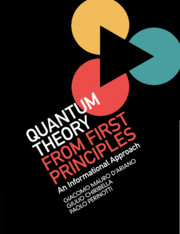Book contents
- Frontmatter
- Dedication
- Contents
- Preface
- Acknowledgments
- 1 Introduction
- Part I The Status Quo
- Part II The Informational Approach
- Part III Quantum InformationWithout Hilbert Spaces
- 8 Encoding Information
- 9 Three No-go Theorems
- 10 Perfectly Discriminable States
- 11 Identifying Pure States
- 12 Diagonalization
- Part IV Quantum Theory from the Principles
- References
- Index
9 - Three No-go Theorems
from Part III - Quantum InformationWithout Hilbert Spaces
Published online by Cambridge University Press: 09 February 2017
- Frontmatter
- Dedication
- Contents
- Preface
- Acknowledgments
- 1 Introduction
- Part I The Status Quo
- Part II The Informational Approach
- Part III Quantum InformationWithout Hilbert Spaces
- 8 Encoding Information
- 9 Three No-go Theorems
- 10 Perfectly Discriminable States
- 11 Identifying Pure States
- 12 Diagonalization
- Part IV Quantum Theory from the Principles
- References
- Index
Summary
Quantum information theory is a wide area of investigation, which includes two main subjects: quantum computation and quantum communication. The success of quantum computation theory is due to a positive result: Shor's algorithm. The algorithm provides factorization of integers in a much more efficient way with respect to what is achieved not only by present-day computers, but even by the most powerful conceivable computers based on classical physics. On the other hand, the success of quantum communication is due to the intrinsic security of ideal quantum cryptographic protocols, and thus relies on a negative result, that is the impossibility of reading quantum information without scrambling it in an unrecoverable way.
The no information without disturbance property spawns other no-go theorems, which represent some of the most famous and classic results in quantum information theory. Among these results one can certainly list the no-cloning theorem, stating the impossibility of copying quantum information. This impossibility is clearly a consequence of the impossibility of extracting information without disturbing it. Indeed, if we could copy exactly the state of a system, reproducing it on another system of the same type, then we would also be able to iterate this process, and produce as many copies as we want. We could then extract all the information we are interested in from the copies, keeping the original intact.
This argument is so simple, but hides a very deep point about quantum information, and more generally about any type of information that can be purified. Suppose indeed that there exists a measurement allowing us to determine the state of a system, with absolute precision. We could then use such a measurement on the system, and once we know its exact state, we can in principle re-prepare the same state as many times as we want. If copying the state is forbidden within a theory, we must then conclude that, in that theory, measuring the state is forbidden, too! This is exactly the case in theories with purification, and in particular in quantum theory.
In quantum theory, determining the state of a system is impossible. We can only have some information about what state our system is prepared in. The information may be accurate, but it will never be certain. This could be practically the case in classical theory, too.
Information
- Type
- Chapter
- Information
- Quantum Theory from First PrinciplesAn Informational Approach, pp. 206 - 217Publisher: Cambridge University PressPrint publication year: 2017
